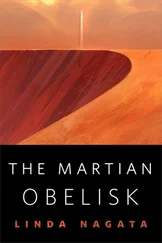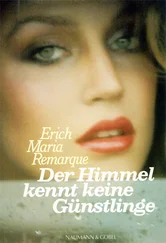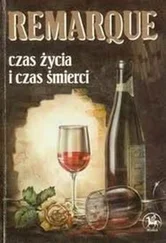I look with admiration at this man of the world. He smiles in a superior fashion. The Breviary of Good Manners is superfluous for him. I forego wisecracks. Wit wears thin against someone able to give amethyst rings. The lady wrestlers get up lazily and try a couple of holds. Willy looks at them with interest. “Capital women,” he whispers to me like a first lieutenant of the Kaiser’s time.
“What’s the matter with you? Attention! Eyes right!” a resonant voice roars behind us.
Willy jumps. It is Renée, exhibiting her ring and smiling. “See now what I mean?” Willy asks.
I see it all right. The two leave. Outside, Willy’s car is waiting, the red town car with leather upholstery. I’m glad Gerda is taking longer to dress. At least she won’t see that car. I wonder what I can offer her tonight. The only thing I have besides the breviary for men of the world is tickets for Eduard Knobloch’s restaurant—and they unfortunately aren’t valid in the evening. I decide to try them, nevertheless, and to pretend to Eduard that they are the last two.
Gerda comes in. “Do you know what I’d like, my pet?” she says before I can open my mouth. “Let’s go into the country for a while. We’ll take a streetcar. I want to go for a walk.”
I stare at her, not trusting my ears. A walk in the country—exactly what Erna, that poison-tongued serpent, reproached me for. Has she mentioned it to Gerda? She would be quite capable of it.
“I thought we might go to the Walhalla,” I say cautiously and mistrustfully. “They have magnificent food there.”
Gerda shakes her head. “Why? It’s much too nice for that. I made some potato salad this afternoon. Here!” She holds up a package. “We’ll eat it in the country, and we can buy sausages and beer to go with it. All right?”
I nod silently, more suspicious than ever. Erna’s reproach about the seltzer water, sausage, beer, and cheap wine of no vintage still sticks in my mind. “I have to be back at nine in that stinking hole, the Red Mill,” Gerda explains.
Stinking hole?, I stare at Gerda once more. But her eyes are clear and innocent, with no trace of irony. And suddenly I understand! What’s paradise for Erna is nothing but a place of employment for Gerda! She hates the dive that Erna loves. Rescued, I think. Thank God! The Red Mill with its fantastic prices sinks out of my mind like Gaston Munch as the ghost in Hamlet disappearing through the trap door at the city theater. Instead, the vision of priceless quiet days with sandwiches and homemade potato salad rises before me! The simple life! Earthly love! Peace of soul! At last! Sauerkraut, if you like, but sauerkraut, too, can be magnificent! With pineapple, for example, cooked in champagne. To be sure, I’ve never eaten it that way, but Eduard Knobloch says it’s a dish fit for reigning kings and poets.
“All right, Gerda,” I say casually. “If that’s what you really want, we’ll go for a walk in the woods.”
The village of Wüstringen is gay with flags and bunting. We are all assembled—Georg and Heinrich Kroll, Kurt Bach, and I. The war memorial has been delivered and is now to be dedicated.
This morning the ministers of both denominations celebrated their rites in church; each for his own dead. In this the Catholic minister had the advantage; his church is bigger, it is brightly painted, his stained-glass windows, incense, brocaded vestments, and acolytes clad in white and red. The Protestant has no more than a chapel with sober walls and plain windows; now, standing beside the Catholic man of God, he is like a poor relation. The Catholic is attired in a lace tunic and is surrounded by his altar boys; the other is wearing a black coat, his single splendor. As a professional advertising man I have to admit that in these things Catholicism has an enormous advantage over Martin Luther. It appeals to the imagination and not to the intellect. Its priests are arrayed like native witch doctors; a Catholic service with its colors, its atmosphere, its incense, its picturesque usages is incomparable as a performance. The Protestant feels this; he is thin and wears spectacles. The Catholic is red-cheeked, plump, and has beautiful white hair.
Each of them has done what he could for his dead. Unfortunately, among the fallen are two Jews, sons of Levi, the cattle merchant. For them no spiritual comfort has been provided. The two rival men of God join forces in opposing the presence of the rabbi—supported by the president of the veterans’ organization, Major Wolkenstein, retired, an anti-Semite who firmly believes the war was lost because of the Jews. If you ask him why, he straightaway brands you as a traitor. He was even against having the names of the two Levis engraved on the memorial tablet. He maintained they had beyond question fallen far behind the front. Finally, however, he was outvoted. The mayor exerted his influence. His own son died of grippe in 1918 in the reserve hospital in Werdenbrück without ever having been in the field. The mayor wanted him, too, to appear as a hero on the memorial tablet and so he declared that death is death and a soldier a soldier—thus the Levis got the two lowest places on the back of the tablet where, no doubt, the dogs will piss.
Wolkenstein is wearing complete imperial uniform. That, to be sure, is forbidden, but who is going to do anything about it? The strange transformation that began shortly after the armistice has gone forward steadily. The war which almost every soldier hated in 1918 has slowly become, for those who survived intact, the great adventure of their lives. They came back to the everyday life that had seemed a paradise to them when they lay in the trenches and cursed the war. Now it has become commonplace again, filled with cares and vexations, and at the same time the war has gradually risen on the horizon—far off, survived, and for that very reason, without their intention and almost without their cooperation, changed, transfigured, falsified. Mass murder has become an adventure from which they have escaped. The despair is forgotten, the misery glorified, and death, which did not strike them, has become what it is most of the time to the living—something abstract and no longer real. It only gains reality when it strikes close by or reaches out and seizes you. The veterans’ organization, now drawn up in front of the memorial under the command of Wolkenstein, was pacifistic in 1918. Now it has become strongly nationalistic. Wolkenstein has adroitly transformed the memories of the war and the feelings of comradeship, which almost all of them had, into pride in the war. Anyone who is not nationalistic desecrates the memory of our fallen heroes—those poor, mistreated, fallen heroes who would all have loved to go on living. How they would sweep Wolkenstein from the platform where he is now speaking if they but could! But they are defenseless and have become the possession of thousands of Wolkensteins who use them for their selfish ends concealed under such words as patriotism and national pride. Patriotism! For Wolkenstein that means wearing a uniform again, becoming a colonel, and once more sending people to death.
He thunders mightily from the tribunal, warming to his theme: the inner cur, the dagger in the back, the unconquered German army, and the oath to our dead heroes, to honor them, to avenge them, and to rebuild the German army.
Heinrich Kroll listens reverently; he believes every word. Kurt Bach, who as creator of the lion with the lance in his flank has been included in the invitation, stares dreamily at the shrouded memorial. Georg looks as though he would give his life for a cigar; and I, wearing a borrowed morning coat that is too small for me, wish I were at home in bed with Gerda in our vine-draped room while the orchestra in the Altstädter Hof bangs out the “Song of the Siamese Guards.”
Читать дальше








